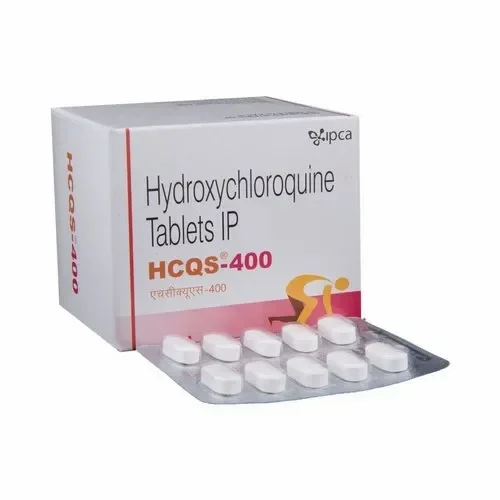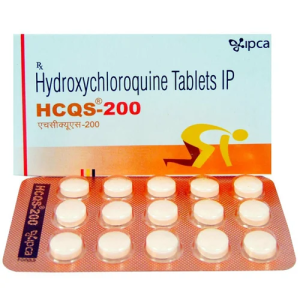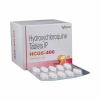Hydroxychloroquine 400mg (HCQS)
$145.00 – $415.00Price range: $145.00 through $415.00
Manufacturer/ Marketer : IPCA
Pack Size : (1×10)
Active Ingredient : Hydroxychloroquine 400mg
Category : Autoimmune Conditions / Antimalarials
Dosage Form : Tablet/Oral
What is Hydroxychloroquine 400mg ?
Hydroxychloroquine 400mg is a medication that belongs to a class of drugs known as antimalarials. It is primarily used to treat and prevent malaria, a mosquito-borne infectious disease caused by the Plasmodium parasite. Hydroxychloroquine is also used to manage certain autoimmune and inflammatory conditions, including rheumatoid arthritis and systemic lupus erythematosus.
Here are some key points about Hydroxychloroquine 400mg:
- Antimalarial Use: Hydroxychloroquine is used to treat and prevent malaria. It works by interfering with the growth and reproduction of the malaria parasite within the red blood cells, thereby helping to control the infection.
- Rheumatoid Arthritis and Lupus: Hydroxychloroquine is prescribed for the treatment of autoimmune conditions such as rheumatoid arthritis and systemic lupus erythematosus. It is considered a disease-modifying antirheumatic drug (DMARD) and is used to manage symptoms like joint pain and inflammation in these conditions.
- Mechanism of Action: While the exact mechanism of action in treating autoimmune diseases is not fully understood, hydroxychloroquine is thought to have anti-inflammatory and immunomodulatory properties that may help reduce the immune system’s abnormal responses seen in autoimmune diseases.
- Dosage: Hydroxychloroquine is available in various strengths, including 400mg tablets. The specific dosage prescribed depends on the condition being treated, the patient’s weight, and other factors. It’s essential to take the medication exactly as prescribed by a healthcare provider.
- Safety Considerations: Hydroxychloroquine should be used under the guidance of a healthcare professional. Long-term use can have potential side effects, including effects on vision (such as retinopathy), so regular monitoring is essential for patients on prolonged therapy.
It’s important to use Hydroxychloroquine only as prescribed by a healthcare provider and to follow their recommendations regarding its use for specific medical conditions. If you have questions or concerns about Hydroxychloroquine or its potential use, it’s advisable to discuss them with a qualified healthcare professional who can provide guidance based on your individual health needs.
Side Effects of Hydroxychloroquine 400mg
Hydroxychloroquine 400mg, like any medication, can cause side effects in some individuals. It’s necessary to keep in mind that not everyone will experience these side effects, and some people can experience them to a greater degree than others. Common side effects of Hydroxychloroquine 400mg may include:
- Gastrointestinal Symptoms:
- Nausea
- Vomiting
- Diarrhea
- Abdominal pain or discomfort
- Skin Reactions:
- Skin rashes or itching are relatively common side effects.
- Mild Dizziness or Headache: Some individuals may experience mild dizziness or headaches.
- Blurred Vision: Vision changes, such as blurred vision or difficulty focusing, can occur in some people taking Hydroxychloroquine. These changes are usually reversible when the medication is discontinued.
- Mood and Behavioral Changes: Rarely, Hydroxychloroquine may cause mood swings, anxiety, or changes in behavior.
- Heart Rhythm Changes: In very rare cases, Hydroxychloroquine can affect the heart’s electrical activity, leading to arrhythmias (irregular heartbeats).
- Muscle Weakness or Pain: Muscle weakness or pain can occur, especially in higher doses or with prolonged use.
- Hearing Changes: Some people may experience hearing changes or ringing in the ears (tinnitus).
- Blood Disorders: Hydroxychloroquine can rarely affect blood cells, leading to conditions like anemia or a decrease in white blood cell count. Regular blood monitoring may be necessary.
- Liver and Kidney Function: In rare instances, Hydroxychloroquine can affect liver and kidney function.
It’s important to report any unusual or severe side effects to your healthcare provider promptly. Additionally, it’s crucial to have regular check-ups and monitoring while taking Hydroxychloroquine, especially if you are on long-term therapy for conditions like rheumatoid arthritis or systemic lupus erythematosus (SLE).
Hydroxychloroquine should only be used under the guidance of a healthcare provider, and the benefits of the medication should be weighed against the potential risks. It should not be used without a prescription or for off-label purposes unless specifically recommended by a qualified healthcare professional.
| Qty | 150 Pills, 300 Pills, 450 Pills |
|---|
Related products
Hydroxychloroquine
Hydroxychloroquine




